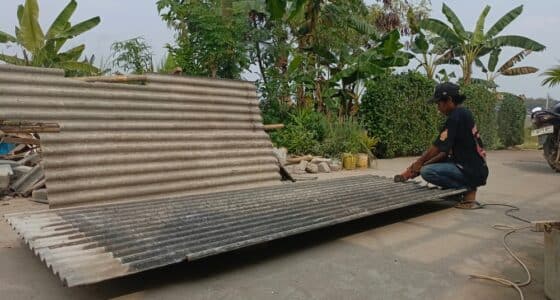Asbestos has been used in construction and industrial settings for centuries, but once the link between exposure to the mineral and mesothelioma was established, countries around the world banned its use. Lobbyists for the asbestos industry have successfully blocked bans in other countries, including the United States, and now Indonesia is seeing its efforts being threatened by a new tactic: aggressive litigation.

Despite Evidence of Mesothelioma Risk, Asbestos Industry Fights Ban
Despite its known link to mesothelioma, asbestos use is extremely common in Indonesia, where asbestos is frequently used for roofing and discarded sheeting can be found littering areas near homes. Following efforts by Indonesian health and workers’ rights groups, the country’s Supreme Court ordered mandatory labeling on all asbestos products that warned of the risks of serious illnesses. In response, a powerful coalition of asbestos producers, called the Fibre Cement Manufacturers’ Association (FICMA), is now suing the advocacy groups, arguing that chrysotile asbestos is harmless.
Despite extensive evidence of chrysotile’s link to mesothelioma and other diseases, FICMA’s attorneys have argued that the carcinogenic material is “quickly broken down in the respiratory system” and is “rapidly eliminated from the lungs.” They say that because the United Nations’ Rotterdam Convention does not include the white asbestos, the labeling should cease. They are also seeking damages of $520,000 a month and penalty charges of more than $300 a day for failure to pay.
World Health Organization Estimates 1,600 Annual Asbestos Deaths in Indonesia
While the United Nations’ treaty does not include chrysotile in its list of hazardous chemicals, the World Health Organization states that “all forms of asbestos, including chrysotile, are carcinogenic to humans,” and specifically cites mesothelioma, as well as cancers of the lung, larynx, and ovaries as a risk of exposure. The organization estimates that 1,600 Indonesians and 200,000 people worldwide die of asbestos-related diseases each year, attributing 70 percent of all work-related cancers to the mineral.
In addition to suing the advocacy groups, FICMA is also suing three individual members of the Local Initiative for Occupational Safety and Health Network, a workers’ rights group. It is demanding a public apology on national television and other media, and wants references to chrysotile deleted from the country’s Ban Asbestos Network website.
As efforts to ban asbestos globally continue, the Patient Advocates at Mesothelioma.net are here to help those who’ve already been affected by the mineral. For more information, contact us today at 1-800-692-8608.
